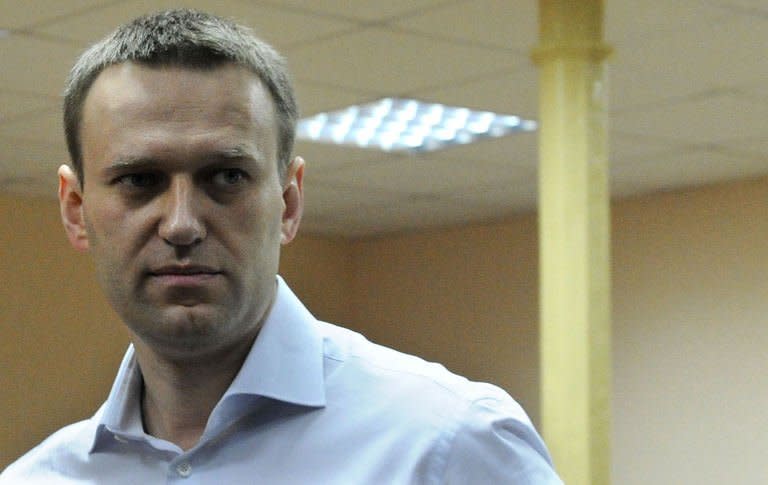Putin foe Navalny goes on trial in Russia
Russian opposition leader Alexei Navalny went on trial Wednesday on charges he says were ordered by President Vladimir Putin to eliminate a top opponent, but the process was swiftly adjourned for a week to allow the defence more time to prepare. Hundreds of journalists and Navalny supporters descended on the provincial northern city of Kirov 900 kilometres (560 miles) from Moscow for the trial of Navalny and a co-defendant on embezzlement charges related to a timber deal. But the first act in what the opposition claims is the latest political show trial in Putin's Russia was over in less than 40 minutes after Judge Sergei Blinov agreed to give the defence more time, adjourning the trial for one week until April 24. Navalny, who risks up to 10 years in prison in the embezzlement case, has predicted he will be convicted and possibly jailed. Even a suspended sentence would make it illegal for him to run for office. The trial is a potential turning point in the standoff between the Kremlin and the opposition that erupted with mass opposition protests in the winter of 2011-2102 ahead of Putin's return for a third Kremlin term last May. Navalny -- who emerged as by far the most eloquent of the protest leaders -- had raised the stakes ahead of the trial by announcing earlier this month he wanted to stand for president. The 36-year-old is a new breed of Russian protest leader who has yet to fully embrace party politics but has built a huge Internet following with sharply-written blogs and corruption exposes. Dressed in a white shirt without a tie and jeans and looking relaxed, Navalny, 36, sat with his lawyers and co-defendant Pyotr Ofitserov. His right hand was bandaged after a minor injury. Navalny flashed smiles and used a mobile phone emblazoned with Putin's face and the word "thief" to take a picture of the dozens of journalists pointing cameras at him. The proceedings had got off to a chaotic start with judge Blinov's opening statements an almost inaudible mumble and Navalny supporters yelling at him to turn up the volume. Navalny arrived in Kirov on the night train from Moscow in a dramatic entrance that some bloggers compared to Vladimir Lenin's arrival in Russia by train ahead of the 1917 revolution. "One way or another I am sure that during the hearing my innocence will be completely proved. But what decision the judge makes or whoever makes the decision, we'll see," Navalny said after the adjournment. "I won't go on about how the case is fabricated and falsified. I am completely innocent," he said. Noting that he had posted the case documents online, he added: "I think any person even without legal education can be sure of this." It is the latest trial in post-Soviet Russia to be denounced by the opposition as a political act of revenge by Putin, after the jailing of anti-Kremlin tycoon Mikhail Khodorkovsky and the radical punk group Pussy Riot. Navalny is charged with organising the misappropriation in a timber deal of more than 16 million rubles ($512,000/388,000 euros) from the Kirov regional government that he advised in 2009. Blinov, who at 35 is a contemporary of Navalny, has over the last two-and-a-half-years handed out 130 convictions and no acquittals, according to the New Times weekly. Russia's respected liberal former finance minister Alexei Kudrin wrote on his blog that the case against Navalny resembled "time travel" back to Soviet times. Navalny's anti-corruption campaign has won a huge Internet following, boldly making claims against powerful foes like Investigative Committee chief Alexander Bastrykin and Deputy Prime Minister Igor Shuvalov. But he still faces a struggle to make an impact at a national level, with polls showing that only a third of Russians know who he is. Navalny's claims that the case is a political set-up were at least partially confirmed last week by the spokesman of the Investigative Committee who said the opposition leader had drawn attention to himself with his "teasing" of the Kremlin.



